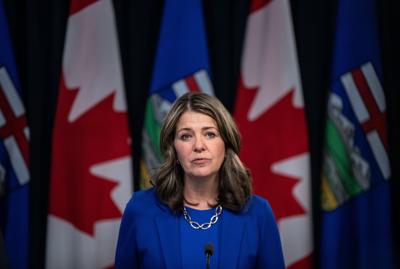For decades, Quebec has been the province to voice desire for referendums, but recently talk of separating has been blowing over the prairies. This latest iteration is being pushed under the banner of autonomy and fairness, driven by frustration over another federal Liberal government and a growing sense of Western alienation.
As a born and raised Albertan, currently living in B.C., I know what it feels like to have the election called before our polls are even closed. IŌĆÖm not void of empathy, but letŌĆÖs call Alberta separatism what it is: a distraction.
The notion of Alberta breaking off from Canada is not only legally and logistically unfeasible ŌĆö itŌĆÖs political theatre that drains energy from real, achievable reform. If Albertans genuinely want their voices to count in Ottawa, the only path forward is not separation. ItŌĆÖs electoral reform.
Under the , Alberta would need to hold a referendum with a clearly worded question and, after that, a ŌĆ£clear majorityŌĆØ of votes in favour. Only then would the federal government be required to negotiate the terms of separation ŌĆö not grant it. These negotiations would include all provinces and the federal government, and would require a constitutional amendment, needing unanimous consent from every provincial legislature and Parliament.
Even if Alberta passed a referendum tomorrow, it would still be many years ŌĆö possibly decades ŌĆö before secession could be realized, if ever. Premier Danielle┬ĀSmithŌĆÖs efforts might fast-track a referendum vote, but she canŌĆÖt bypass the legal and constitutional obligations that follow.
And then thereŌĆÖs the logistics. More than ŌĆö federally owned and controlled. ThatŌĆÖs not going anywhere. The same applies to borders: Alberta doesnŌĆÖt own its border with the U.S. ItŌĆÖs a national boundary under federal jurisdiction. Any trade across it, particularly vital oil and gas exports, would suddenly become subject to negotiation.
Most critically, . The majority of the province, including all major cities, sits on land covered by treaties signed between Indigenous nations and the crown ŌĆö agreements that predate AlbertaŌĆÖs creation. First Nations leaders across the province have repeatedly . These treaties are with Canada, not Alberta.
If all of this sounds complicated, itŌĆÖs because it is. And thatŌĆÖs before we even get into the economic chaos that would follow ŌĆö questions around CPP, EI, OAS, federal pensions, veterans’ benefits, and health-care funding. A referendum alone could cost several millions of dollars. That should mean something to conservatives who tend to vote for fiscal restraint.
Separating is not an actionable plan, itŌĆÖs reactive and chaotic.
Albertans feel ignored. The governing Liberal party won only a sprinkling of seats in Alberta. Yet that same government now sets policy for the entire country. ItŌĆÖs easy to see why that feels unjust to an Alberta voter.
The issue isnŌĆÖt that Alberta is part of Canada ŌĆö itŌĆÖs that Alberta is part of a system that routinely discounts large swaths of the population. First-past-the-post, CanadaŌĆÖs current electoral system, turns minority parties into majority governments and treats entire regions as irrelevant if they vote the ŌĆ£wrongŌĆØ way. It makes your vote matter only if you live in a swing riding.
Electoral reform ŌĆö specifically proportional representation ŌĆö would change that.
In a proportional system, the number of seats a party receives in Parliament more accurately reflects the number of votes it received nationwide. That means if a party wins 30 per cent of the vote, it gets about 30 per cent of the seats ŌĆö not a majority, not a landslide, just a fair share.
This kind of system would transform AlbertaŌĆÖs role in the federal landscape. Conservatives wouldnŌĆÖt just sweep Alberta and then get ignored in government ŌĆö theyŌĆÖd actually hold seats in proportion to their national support. Smaller parties like the NDP, Greens, or even region-specific parties could gain influence without being penalized by vote concentration. Indigenous-led or Western-focused parties could finally find footing in federal politics without being sidelined by geography.
are not radical. TheyŌĆÖre used in more than 90 countries, including Germany, New Zealand, Sweden, and Scotland.
Proportional representation would also alleviate the polarization we’re seeing in Canadian politics. Under first-past-the-post, political parties focus┬Āon a handful of battleground ridings,┬Āignoring the rest. ThatŌĆÖs why voters in Alberta and the prairies feel invisible. In a proportional system, every vote would count ŌĆö regardless of postal code.
Instead of shouting “WeŌĆÖre leaving,” Albertans should be leading the charge for national reform.
The way forward isnŌĆÖt out ŌĆö itŌĆÖs through democracy that actually reflects the will of the people.



























To join the conversation set a first and last name in your user profile.
Sign in or register for free to join the Conversation